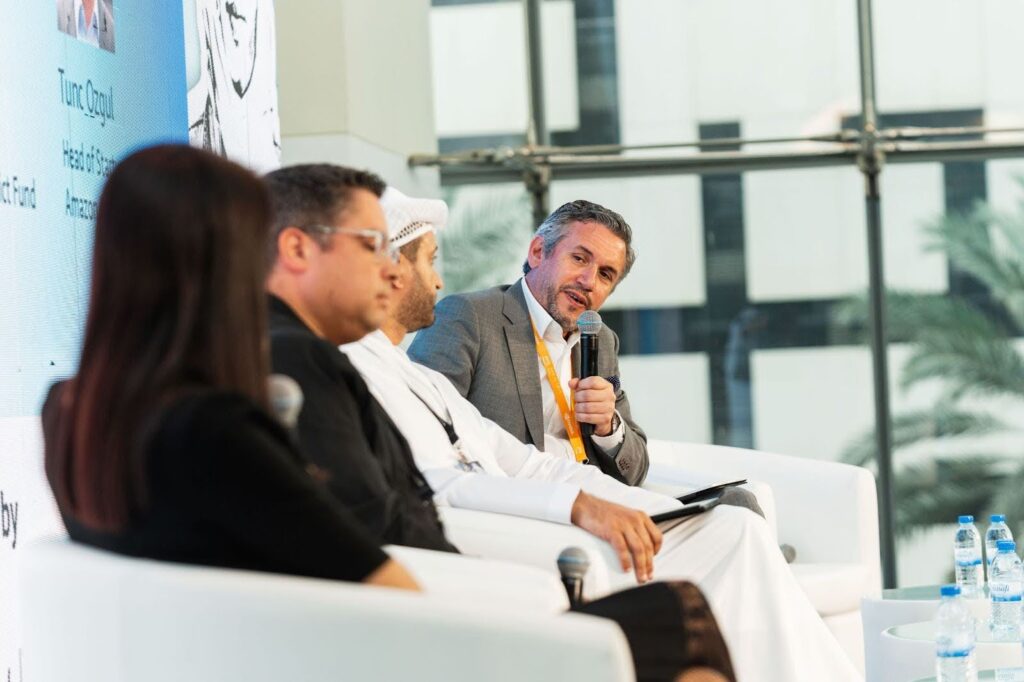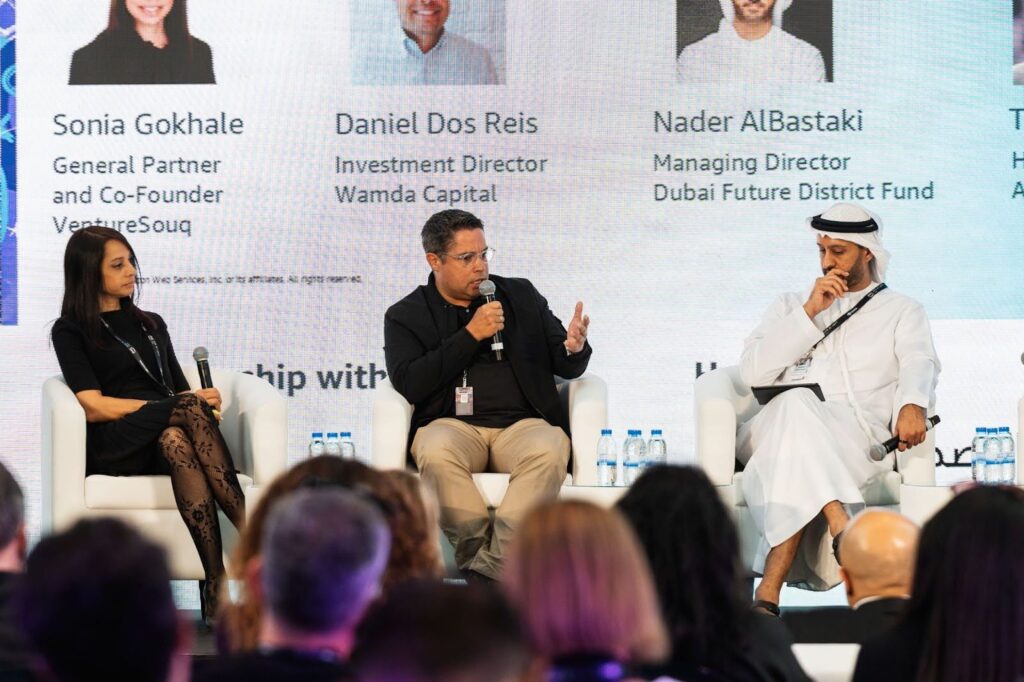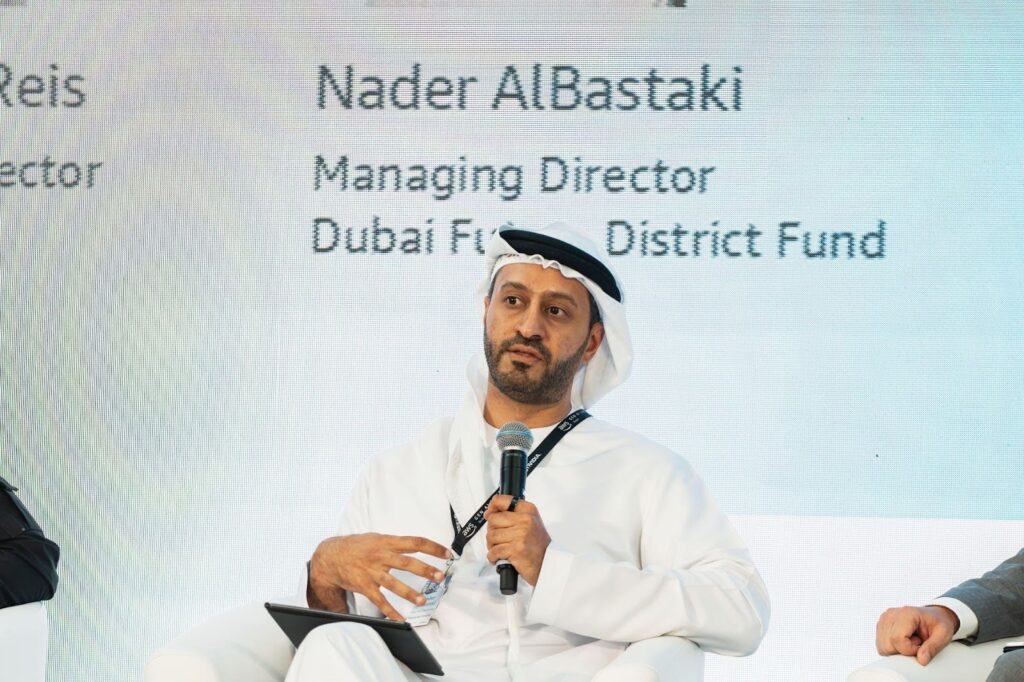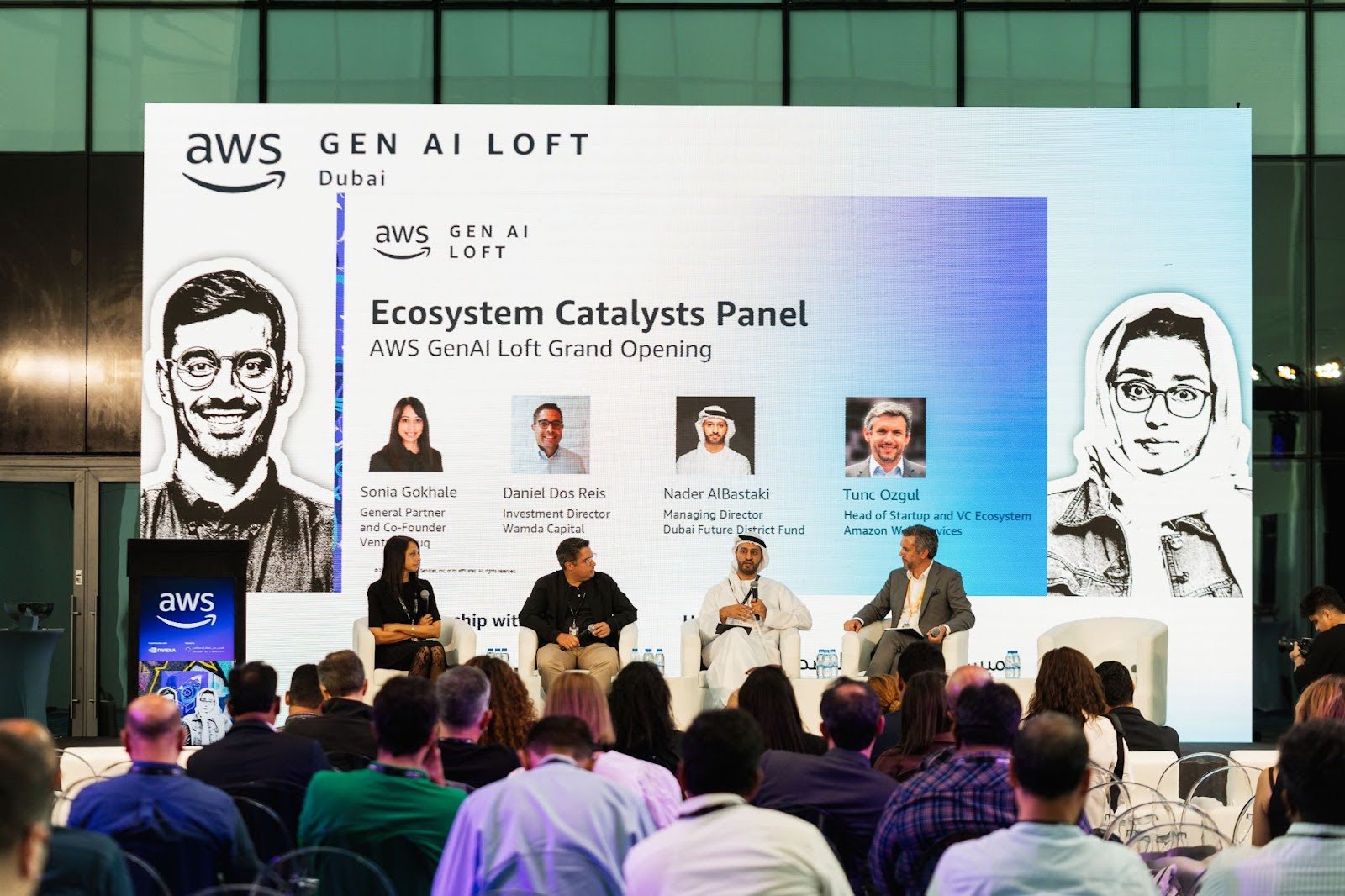On April 7th, the AWS GenAI Loft Dubai kicked off at the DIFC Atrium, hosted by the Dubai AI Campus and supported by NVIDIA. The event ran through till April 11th, offering early-stage startups access to hands-on workshops, deep-dive sessions, and one-on-one mentorships with AWS Solutions Architects.
DFDF joined a panel discussion during the kick-off, alongside other prominent regional investors, to discuss where the AI opportunity lies, how the landscape is shifting, and what founders and fund managers need to keep in mind as they build in and for the MENA region. The session was moderated by Tunc Ozgul, Head of Startup and VC Ecosystem at Amazon Web Services, and featured:
- Nader Albastaki, Managing Director at Dubai Future District Fund (DFDF)
- Sonia Gokhale, General Partner and Co-founder at VentureSouq
- Daniel dos Reis, Investment Director at Wamda Capital
Here are the key takeaways from the discussion.

Turning Inward: A More Localised Investment Strategy
The panel opened by reflecting on how investment approaches have shifted alongside the evolution of the regional startup ecosystem. Where once the focus was on identifying global opportunities — particularly in mature markets like the US, India, or LATAM — today there’s a growing confidence in what’s unfolding at home.
Capital is increasingly being deployed into the GCC, especially the UAE, where policy, infrastructure, and entrepreneurial momentum are converging. Investors are no longer looking to broadly diversify across verticals or geographies. Instead, they are zeroing in on specific sectors where they can build deep conviction—such as fintech, climate tech, and AI-driven software—and apply more targeted expertise.
This thematic and regional concentration reflects both the maturity of the ecosystem and a strategic effort to unlock local impact with global relevance.

AI and the Need for Depth Over Demos
Unsurprisingly, Generative AI dominated the discussion. While excitement around AI continues to grow, the panel was quick to call out the dangers of over-indexing on the buzz.
Investors are seeing an influx of startups incorporating GenAI into their decks — often as a catch-all enhancement to drive up valuation rather than a critical part of the solution. But deploying AI for the sake of it doesn’t stand up to scrutiny. What matters is whether the technology meaningfully advances a company’s ability to solve a real problem.
As a result, some firms are now taking steps to stress-test the AI claims in pitch decks — bringing on technical advisors to help evaluate model performance, architecture, and differentiation. AI is also being embedded within investment firms themselves, automating internal operations and enhancing research capabilities, ensuring firms walk the talk.
Ultimately, depth and technical maturity are becoming non-negotiables. Investors want to know whether a startup is using AI to unlock something new — or simply dressing up the same offer with a buzzword.

Solving the Right Problems with the Right Tools
The most compelling companies, the panel agreed, are those built around clearly defined pain points — not those built around a technology trend. Startups that begin with a well-articulated problem and thoughtfully layer in GenAI as part of the solution are more likely to earn long-term backing.
What’s encouraging is that many of the AI applications emerging from the region are industry-specific. Rather than attempting to build broad foundation models, founders are adapting existing technologies to address use cases in legal, healthcare, financial services, and logistics. These targeted implementations allow for faster validation, lower model training costs, and quicker go-to-market.
This vertical approach is particularly relevant in MENA, where high-impact, niche problems abound and where even incremental improvements in automation or insight can deliver outsized value.
Valuations, Runway, and Capital Discipline
The panel also tackled the pricing pressure created by the AI boom. Startups operating in AI-adjacent spaces are raising rounds at aggressive valuations, driven in part by investor fear of missing out. But high valuations without corresponding fundamentals can create downstream challenges—not only for investors but for the startups themselves.
There was a shared emphasis on the importance of capital efficiency, particularly at the early stage. Founders are increasingly seeking larger cheques out of the gate, hoping to avoid multiple fundraising cycles. But this comes with trade-offs. More capital means more expectation, more dilution, and more pressure to hit aggressive growth targets.
Startups that show thoughtful resource allocation, a clear understanding of their burn, and flexibility in adapting to new market realities are more likely to earn sustained support. Investors aren’t just looking for great ideas — they’re looking for founders who know how to pace the journey.
Beyond Capital: Enabling the Ecosystem
More than once, the conversation circled back to the role investors play as enablers — not just funders. There’s growing recognition that capital is only part of what startups need to thrive. Strong ecosystems are built on infrastructure, mentorship, regulatory clarity, and access to talent.
Many funds in the region are now acting as feedback loops — listening to what their portfolio companies need, identifying systemic gaps, and collaborating with public and private partners to address them. This includes everything from advocating for AI-friendly policies to helping build local talent pipelines.
This ethos of enablement is core to DFDF’s mission. As an anchor fund and long-term ecosystem builder, DFDF operates with the belief that startups succeed not in isolation, but when the environment around them is conducive to growth. That means investing not just in companies, but in capacity.
Dubai’s AI Moment: Opportunity Meets Intentionality
The week-long AWS GenAI Loft Dubai event is one of several recent signals that Dubai is doubling down on AI — not as a trend, but as a transformative economic pillar. With initiatives from both the government (such as setting AI as a priority sector within its D33 agenda) and the private sector, and a proactive approach to infrastructure, the city is positioning itself as an ideal launchpad for AI-native ventures.
But the moment requires more than optimism. It demands intentionality. For founders, that means solving real problems with real technology. For investors, it means backing substance over spin and staying responsive to what the ecosystem truly needs.
The panel concluded with a shared sense of responsibility. This is a formative chapter for both startups and venture capital in the region. And while the excitement around AI is justified, the companies that will endure are those that lead with clarity of purpose, sound execution, and technical depth — supported by capital that believes in the long game.

